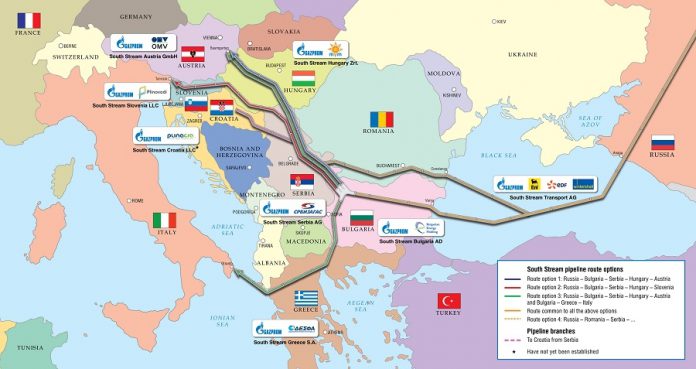By Rumyana Vakarelska
Last week, President Putin has unilaterally declared Russia’s cancellation of South Stream during an official visit to Turkey, saying that the pipeline planned to run under the Black Sea is now going to reach Turkey. The pipeline, whose planning started 10 years ago was supposed to supply Russian gas to eight EU countries reaching Austria, but instead a new gas pipeline between Greece, Bulgaria and Romania is emerging pointing to the importance of EU membership and its new energy strategy under the EU’s newly created Energy Union of EU 28 a month ago.
Unlike previous times when Russian government’s gas supply threats led to potential gas shortages as it happened five years ago, following the initial crisis between Ukraine and Russia, this time Bulgaria is well prepared with sufficient immediate oil and gas reserves until April.
‘Bulgaria is getting ready to explore the volumes of gas and oil that has got of its own in the North of its Black Sea Coast (Chiren). Reserves in the Khan Asparuh, Silistur and Teres complex are at an exploration stage by 2015-2016 with an estimated capacity of 30 billion cubic meters, which may be sufficient to satisfy Bulgaria gas consumption needs for 30 years, according to Tomislav Donchev’, the Bulgarian Vice-President for Eurofunds and economic policy, talking to BNT.
Boyko Borissov, the Bulgarian Prime Minister, had a detailed report before the Bulgarian Parliament about the reasons why South Stream would not have gone ahead under the current general framework as it contravenes with EU’s energy regulation whereby the supplier could not be a holder of a majority stake as a distributor, while the transit tariffs have to be established by a third party, not the supplier.
According to Borissov, the South Stream inter-governmental agreement between Russia and Bulgaria lacked binding commercial clauses between all the parties involved in South Stream. ‘If South Stream conditions were meeting EU regulations, Bulgaria would have fulfilled its commitments to South Stream, according to the Bulgarian PM speaking at the Bulgarian National Assembly’.
South Stream started in 2007 and the cost of the construction established in 2014 for the project was EUR 4 billion, while the annual profit for Bulgaria was not clearly established in the documentation. So besides some early commitments to South Stream’s infrastructure, including the questionable purchase of forest land near Varna by the Oresharsky government last summer, Bulgaria has not made significant financial commitments to the project.
On 9 December at a dedicated to South Stream meeting in Brussels between all the eight countries involved in the original line up, Greece, Bulgaria and Romania have revealed a joint statement before EU’s Energy Union Commissioner Maros Sefcovic that the three countries are now planning a new gas supply project between, whereby the new pipeline will use one of the long-planned regional Interconnectors to access gas coming from Greece.
This fast historic reaction on behalf of the three countries may lay the foundations of the region’s dependence on Russian gas and help the Bulgarian government push with its evolving and long awaited new Energy sector strategy.
At a parallel meeting in Brussels between EU’s energy ministers, the German Energy Minister Zigmar Gabriel has Hosting expressed that South Stream may still happen when the relations between Russia and Ukraine settle, but at the moment this prospect seems highly unlikely. Meanwhile, the Russian government and the Russian state monopoly
Gazprom are making steps to get out of the existing wide-brush South Stream inter-governmental agreement, while tying up for as similar deal instead with Turkey by creating a new company to build a transit pipeline under the Black Sea.
This time Bulgaria seems to be taking a step in the right direction towards its belated strategic update on its long-term energy strategy, while a regional cooperation in Europe’s South East that is conceived by EU member states in the region is a sign for the long-awaited regional consolidation that would help Bulgaria and its neighbours move in the right direction towards a long-standing energy security, independence and diversity, which are also three of the leading principles of EU’s Energy Union.
Copyright@2014Rumy Vakarelska
Budilnik’s first English language page carrying original journalistic content is written by Rumy Vakarelska of Team New Europe in London. Sponsors or organisations willing to be covered on the page, please contact the author.





















